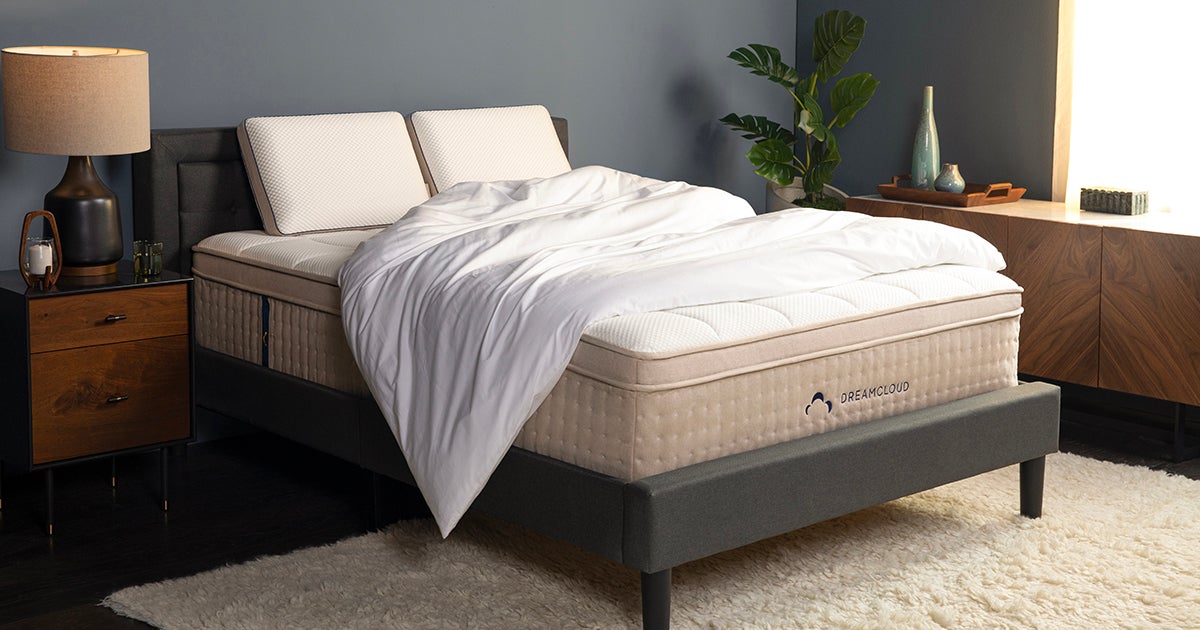SOFT-TO-THE-TOUCH COVER
Keep cozy and cool with quilted foam and cashmere on top.
PRESSURE-RELIEF COMFORT LAYER
Get relief wherever you need it with gel memory foam that contours to your shape.
SINK-IN-JUST-RIGHT LAYER
Sink in, but don’t get swallowed alive – this layer ensures it.
TARGETED-SUPPORT COIL LAYER
Get custom relief with innerspring individually wrapped coils that adapt to your body.
ESSENTIAL BASE LAYER
This layer ensures everything above it performs at its best.






by Venkata
The mattress looks premium and very comfy. Definitely miss my bad during travel or vacations.
by Christopher
My parents got a dream cloud for their place in LA. They love it! I just moved into my post college apartment and first thing I wanted was a “post college” great new mattress. I took my moms suggestion and got the Dream Cloud for my place. I got a queen. I’m 6’2” and this bed (on the platform base) is the best nights sleeping mattress I’ve ever had!!! Moms are right 💯 of the time! My twin brother got wind of this amazing mattress and he got the same for his post college apartment. Queen bed / platform base. Feels like a fancy hotel mattress! We all love our beds!
by Kyle
It has been 1.5 months since we changed over to our new DreamCloud Premier King mattress. So far we can say that is was an excellent choice. It is certainly more firm than our previous pillow top, but it conforms nicely to our bodies for a comfortable feel. We are mostly side sleepers and it seems this mattress works perfectly for this type of sleeping; as it conforms to our bodies but still provides the support required to maintain proper posture. I have also noticed a huge improvement with regards to heat. Our pillow top would get quite hot during the night, especially in the summer months. However, I have not noticed heat being an issue and we just finished August, the hottest month here in Texas. So the Premier mattress definitely has a very good cooling system based on its design and materials. Overall, we are extremely pleased with our purchase. This is without a doubt a very well made product that is surely designed/engineered with modern technology and the latest sleep demands.
by Julia
This is the first mattress I have ever bought. The process was extremely easy to buy and set up. The mattress is pretty firm which I like.
by Brittney
My husband and I spent days researching different brands and decided to pull the trigger and purchase the Premier Rest. We absolutely LOVE this mattress! It’s amazing for side and back sleepers. If you’re thinking of purchasing from DreamCloud, do it! Don’t forget the lifetime warranty!!! BUY IT – YOU WON’T REGRET IT!
by Anabelle
I love it so much, makes me want to lay in bed all day. Noticed a big difference from my last mattress and I get a much better sleep at night. I hardly wake up with pains anymore. I went through many reviews for a few days of up to 15 different mattress brands and came down to this one and I’m very pleased with my purchase.
by Andrew
The Dreamcloud mattress is the perfect bed for me as a back and stomach sleeper. Just the right amount of firmness for back support.
by Brianna
This mattress feels like luxury at a non-luxury price. It’s supportive enough to keep my back aligned but feels soft enough that I sigh into bed every night. Extremely happy with my first ever nice mattress purchase.
by Yvonne
I’ve enjoyed sleeping on this mattress
Its soft, comfortable good support, I enjoy going to bed.
by Carolyn
Love it since day 1…everything you guys said it would be…
by Pablo
The mattress is right between firm and soft. It was easy to unbox and set up.
by Austin
I’ve been trying to find a good mattress for stomach sleeping, and this one is just the right comfort level between soft and firm, highly recommended if you sleep the same way!